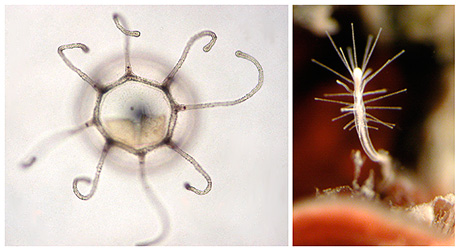Creature of the Week #7: The Immortal Jellyfish
This week's creature comes a little later in the evening than usual, but it's still Friday! Hope you all are having a good one.
Third place on the World of Andovar voting page was "Something from the Sea", so here this week we have the immortal jellyfish!

Usually when a creature has an evocative name like "immortal" it isn't intended literally -- not so in the case of the biological-rules-defying immortal jelly! These critters are thought to be literally immortal, cycling their life phases from mature back to youthful infinitely.
All jellyfish belong to the Cnidaria phylum and have at least two life phases: mobile swimming medusae (which we recognize as the iconic jellyfish) and stationary polyps. The jellyfish life cycle typically starts as a little cyst ejected from a mature swimming jellyfish that latches onto the sea floor, grows into a polyp, possibly multiplies, and then the polyp breaks up into multiple layers, each of which becomes a mature medusa.
Once the adult medusa has lived out its life and spat out some eggs (or sperm) to create the next generation, it usually winds down -- reproducing a few times and then dying. Some medusae live only hours. The bizarre and amazing immortal jellyfish, though, does something different: once it has cruised around as a medusa for awhile, it skips that whole death thing and turns back into a polyp.

Scientists have verified this transformational ability -- which is similar to a starfish regrowing its arm, but unique in the known biological world in that the entire animal is regenerated -- in the lab, but because jellyfish are so migratory (and because Turritopsis nutricul is so tiny -- only about 1cm in adulthood), determining one's full age in the wild has not yet been possible. BUT all the immortal jellies around the world are genetically identical. And they're spreading.
So here we have one of the strangest things in the sea, a single species of jellyfish that has not only figured out how to defy death, but may be the biological equivalent of grey goo. Sorry nanotech -- nature beat you to it! I have a feeling Philip K. Dick would have loved this creature.
Third place on the World of Andovar voting page was "Something from the Sea", so here this week we have the immortal jellyfish!

Usually when a creature has an evocative name like "immortal" it isn't intended literally -- not so in the case of the biological-rules-defying immortal jelly! These critters are thought to be literally immortal, cycling their life phases from mature back to youthful infinitely.
All jellyfish belong to the Cnidaria phylum and have at least two life phases: mobile swimming medusae (which we recognize as the iconic jellyfish) and stationary polyps. The jellyfish life cycle typically starts as a little cyst ejected from a mature swimming jellyfish that latches onto the sea floor, grows into a polyp, possibly multiplies, and then the polyp breaks up into multiple layers, each of which becomes a mature medusa.
Once the adult medusa has lived out its life and spat out some eggs (or sperm) to create the next generation, it usually winds down -- reproducing a few times and then dying. Some medusae live only hours. The bizarre and amazing immortal jellyfish, though, does something different: once it has cruised around as a medusa for awhile, it skips that whole death thing and turns back into a polyp.

Scientists have verified this transformational ability -- which is similar to a starfish regrowing its arm, but unique in the known biological world in that the entire animal is regenerated -- in the lab, but because jellyfish are so migratory (and because Turritopsis nutricul is so tiny -- only about 1cm in adulthood), determining one's full age in the wild has not yet been possible. BUT all the immortal jellies around the world are genetically identical. And they're spreading.
So here we have one of the strangest things in the sea, a single species of jellyfish that has not only figured out how to defy death, but may be the biological equivalent of grey goo. Sorry nanotech -- nature beat you to it! I have a feeling Philip K. Dick would have loved this creature.